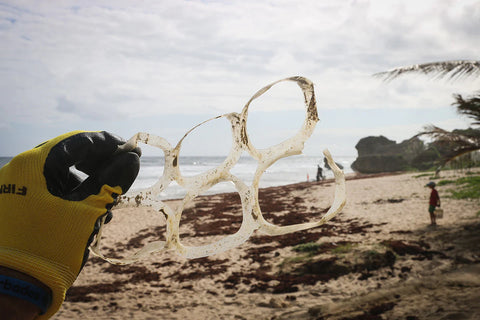The Oceans: Earth's Life-Giving Force in Peril
About two-thirds of the Earth's surface is covered by oceans, encompassing 90% of the total living space. While coastal areas reveal a glimpse of marine life, the dark deep sea remains largely unexplored, with only 5% mapped. Unfortunately, even in these untouched depths, human impact is evident, leaving traces in the form of harmful microplastics.

The Fragile Balance: Oceans as Vital Organisms
The oceans function as life-giving organisms, producing a substantial part of our oxygen through plant plankton and serving as a crucial food source. However, human intervention disrupts this delicate balance. Overfishing, resource exploitation, and plastic waste contribute to oxygen-deficient "death zones," affecting marine life and leading to extreme weather patterns.
Plastic Onslaught: A Looming Environmental Catastrophe
The oceans are now inundated with plastic waste, with over 10 million tons entering annually. Disturbingly, estimates predict a future where plastic surpasses fish in quantity. Massive garbage maelstroms, such as the Great Pacific Garbage Patch, present a grim reality. Despite efforts like the Ocean Cleanup project, the challenge persists, as two-thirds of the garbage remains unseen, sinking to deeper layers.

Impact on Marine Life: A Tragic Consequence
Marine animals suffer gravely from civilization's waste, mistaking plastic for food. Ingested plastic accumulates in their digestive tracts, causing starvation and internal injuries. Sea turtles, whales, dolphins, and numerous species face mortality risks due to plastic ingestion. Lost or discarded fishing nets, indestructible and drifting freely, entangle and drown marine creatures, further compounding the crisis.

Here is what we can do together:
-
Get informed! All environmental protection organizations such as WWF, Greenpeace, NABU and many others offer extensive information material on their websites.
-
Your voice against the plastic flood in the ocean! Environmental protection organizations are constantly coordinating large petitions directed at the responsible governments to tighten and implement laws to protect our oceans.
-
Reduce - reuse - recycle! Start by yourself, no more plastic waste.
-
Buy unpackaged products, use reusable instead of disposable products. Consume consciously and sustainably.
-
When buying cosmetics, clothing and furniture, look for plastic-free products! Certificates and apps will help you,
-
Separate your garbage! Because only the plastic in the bin can be recycled.
-
Get involved! Even in your vicinity, plastic waste is found in nature, in rivers, canals and lakes. Take part in clean-up campaigns or initiate some yourself.
-
Tell your friends about it! Invite them to actions and share your knowledge!